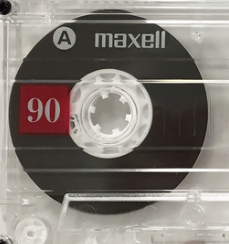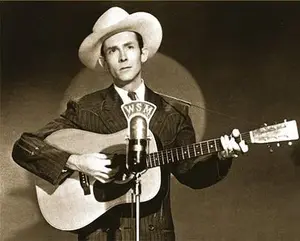Grandmother's Country Music, Honky Tonk
I couldn't begin to tell you what a modern country song sounds like or who the artists would be. I scarcely remember the names of 90s country artists I heard as a child from my mother's radio, which I regularly listened to with my cousins and family.
By age 13, I had completely discarded county music. I moved from punk rock, to hardcore, to emo, to ska, to dancehall, to vaporwave, to witch house, to cloud rap, to hyperpop. You name it, but the point is, I left country music in the dust as soon as I was old enough to do that.
Recently I've been experiencing a return to my familial roots. Except it's not my mother's country that I'm here to tell you about. I want to talk about my grandmother's country music.
Hank Williams Sr.
Even in the 90s, his music sounded very dated but was undeniably part of the history of country music. There's most likely a lot of country listeners who struggle to relate with something like this. The music and vocals are raw but emotive. In some ways, he cries more than Rites of Spring or Saetia in these songs.
I could show you some his more popular ones like Your Cheating Heart or I'm So Lonesome I Could Cry but chances are you've had a chance to hear these at some point. I want you to listen to...
Ramblin' Man, '54
The abject misery of living haunts you from the past in this song. He howls like a tortured spirit, darker than the blackest metal song I've ever heard. The song is barely two complete guitar chords. There's nothing technical about this. It's all emotion.
It's a pretty fucked up place to start but it sets the tone for why I identify with this so much. This is the most iconic artist of the genre that really sets me up to know what I'm looking for.
My Bucket's Got a Hole In It, '49
The story goes that he learned guitar from a street-performing black man that played the blues, Rufus Payne. You can hear the influence often in songs like this one.
I'll Never Get Out Of This World Alive, '52
I love how humor and cuteness is laced with morbidity.
Nobody's Lonesome For Me, '50
The singing is conversational, like he's just having a chat with you. Occasionally there's a yodel, a croon, a howl, but then it just goes back to talking to you.
Alexander's Ragtime Band, '38
Everything I've showed you is from his Greatest Hits (1940s / early 50s). But there is some really old stuff from the 30s. This era is really difficult to listen to just because the sound quality is so bad and you have to use your imagination as to how it would have sounded live, but songs with ragtime piano like this would have been really cool.
Ernest Tubb
He's originally contemporary with Hank Williams but just happens to live a longer, healthier life, so he has a discography that spans decades from the 40s through 70s that is more time consuming to penetrate. I'm not going to pretend to have heard all of it yet.
The 60s is more or less the decade where he is releasing the most work. I figured I'd grab something at the beginning and end of that decade and get a feel for him.
Importance of Being Ernest, '59
Good Year for The Wine, '70
I think he's significantly easier to listen to than Hank Williams in a common consumer kind of way. It's same kind of influences but less crushingly dark and afflicted with alcoholism.
Lefty Frizzell
The Long Black Veil, '59
This is a ballad that was written by Marijohn Wilkin. She actually sings the second verse. I'm pretty sure these were not recorded together originally but someone decided to just splice them together. I could be wrong about that though.
Faron Young
Wine Me Up, '69
This song is how I'm introduced to Faron. I believe my cousin showed me this the last time I visited and that's how I came back to it. This song is actually covered by Ernest Tubb on Good Year for the Wine which is linked above.
Goin' Steady, '52
One thing I've noticed is that honky tonk vocals get significantly cleaner as you get further away from the 50s and into the 70s, which isn't necessarily a bad thing. But I do think the 70's is about as late as I'm interested in going with country, at least for the moment. You can see how much it changed from these two songs.
Conclusion
Despite where I come from, I've never really fit in with the culture of country music. I'm extremely not country in every possible way. And it's something that always set me apart that I eventually had to severe myself from.
But it's interesting that if I look far enough back into the past, it's actually relatable.

